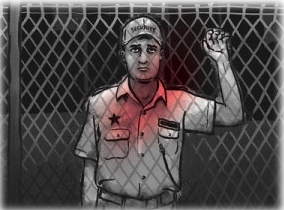In this blog post, Sunidhi, a student of the Rajiv Gandhi National University of Law, Patiala writes about the Police Act of 1861. The blog post tells us why there is an urgent need to replace the current Act.
55% of the cases filed in India are against police officials. The service of the police is essential to the community so as to protect them and stop crime in the community. But if the majority of cases filed in a country are against police officials, then where should the general public reach for help?
It is not only the misconduct of police officials that is the reason for such high rate of cases filed against them but also the outdated Police Act of 1861. This Act was formed after the Mutiny of 1857 by the Britishers to suit their needs, i.e. to rule and suppress Indians and not to serve Indians. This Act continues to govern police forces to this day in many states of India despite far-reaching changes in governance and India’s transition from being a colonized and suppressed nation to a free and sovereign republic.
This Act governs most of the police forces in India. Some states like Maharashtra, Delhi, Gujarat, etc. have enacted new legislations to regulate police forces in the state but the new police Acts are also based on this Act. Thereby, it has failed to bring a major change in the police system of these states.
Efforts of the National Police Commission
The National Police Commission (NPC), 1979-81 made an effort to bring change in the Indian Police system by preparing a draft of ‘Model Police Act’ in its 8th report. This proposed bill has never seen the light of the day. It was a commendable effort by the commission to address the plaguing issues in the Indian Police system.
The model highlights the change in the duties of police force in order to keep up with the changing scenario in India. It details out the imposition of more penalties on the delinquent officers in order to bring efficient results. It has tried to address the problem of accountability by referring to the laws of other nations.
Lacunae in the system
The principles on which the Police Act is based are outdated and meant for oppressing Indians. Also, the police system is completely under the politicians. Therefore, it has been politicized by them to meet their selfish interests.
- The superintendence of police has been vested in the hands of the state government i.e. politicians. The police chief (Director General/Inspector General) is appointed at the pleasure of the Chief Minister. Therefore, police chief may be removed from his/her post without even assigning a reason if he/she does not keep the politicians on his side. The result of this is that the police chiefs follow the policy of appeasing the politicians, and they follow those commands as well which are against their duties. Hence, the police officers remain servants of politicians only and not the public.
The tenure of the police chief should be fixed, so that an honest officer can work without the fear of transfer or removal from the post. To keep a check on the activities of police officials a statutory body called State Security Commission should be created. The NPC Model even suggested the composition of the committee to ensure efficient working of the committee.
- The Head of the Police is appointed in a very secretive way. The politicians have full influence over this post; therefore, the post is politicized and given to a political patron instead of the one who deserves it. Therefore, there should be transparency in appointing a police officer for this post.
- There is no independent body to file complaints against the misconduct of police officials. A civilian has nowhere to go if the police officials do not file his/her complaint or misbehave with him/her. The only place a civilian can approach is Human Rights Commission, but these are also not very powerful institutions to help a complainant as they also do not have the power to do anything, all they can do is make a recommendation to the government which the government can very easily neglect.
In countries like UK, South Africa there is an Independent Police Complaints Commission (IPCC). It supervises and investigates complaints against police officials. The IPCC has access to all the documents and station premises. The head of Commission is appointed after approval from all the parliamentary committees. There is a need to develop such a system in India.
- Not a day passes in India when a complaint against police officer’s excesses is not reported in India. Indian police officers are infamous for their behaviour. They feign illness to delay the work, they abuse the complainant instead of helping him, sometimes connive with the accused to earn money and indulge in many other unacceptable activities.
To counter these activities, a stricter code of conduct and principles should be imposed on them. The code alone cannot bring desirable results; therefore, the penalties imposed on delinquent officers should be revised. At present, the penalties imposed on them are restricted to minor fines but it should be raised to outright dismissal, removal from service, reduction in rank, forfeiture of approved service, reduction in pay, withholding of promotion or increment, etc.
- The terms of service of police are also not very acceptable. They have to work 365 days in a year; there is no provision of holiday for them. They are not even provided food while they are on duty. They have to perform their duty day and night. Any time a complainant may approach, and they have to help him/her. Therefore, this is a very frustrating and tiring job.
They are also human beings. They also need a day off from work to spend quality time with their family. This frustration will directly impact their duty. So, there is a need to make changes in their terms of services.
Hence, there is a need to bring major changes in the present Indian police system by enforcing a new Act to meet the needs of changed scenario.
 Serato DJ Crack 2025Serato DJ PRO Crack
Serato DJ Crack 2025Serato DJ PRO Crack












 Allow notifications
Allow notifications


